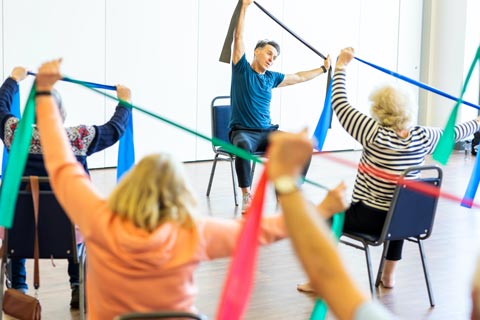Institute for Health and Care Improvement
Reducing inequalities
in health and care
Research theme.
Health is affected by the society and environment that we live in, as well as lifestyle choices made.
At York St John University, our research aims not only to increase population health and wellbeing but to improve the fairness of its distribution. The work of this theme aims to contribute to greater health equity for communities locally, nationally and internationally by producing high-quality applied research.
Our current projects include:
- Health inequalities and rurality: an exploratory case study of North Yorkshire
- Delaying and reversing frailty in rural communities
- Exploring the impact of gender and disability on disordered eating: giving voice to a marginalised and ignored experience
- Inclusive practices in Urgent and Emergency Care
Health inequalities and rurality: an exploratory case study of North Yorkshire

The project will examine the relationship between rurality and health and social care services. A key aim is to determine if it is necessary to categorise rurality as a geographical factor when addressing rising levels of health inequalities.
The work is in collaboration with Healthwatch North Yorkshire, and project benefits will be primarily driven through their information sharing, championing and campaigning work.
For further information contact Dr Sarah Baker or Mark Mierzwinski.
Delaying and reversing frailty in rural communities

Frailty can be defined as a state of physiological vulnerability to external stressors. It increases the risks of illness, falls, dependency, disability, and death. Frailty has been described as the most problematic expression of population ageing.
There is now increasingly clear evidence to support that frailty can be delayed or reversed. Interventions with both muscle strength training and protein supplementation have shown promise both in terms of effectiveness and ease of implementation. However, these interventions are rarely offered to older people with frailty, particularly in rural communities, where there are unique barriers to delivering healthcare services.
This PhD project, led by Ruth Kay, will develop and test an exercise-based intervention targeting frailty amongst rural community dwellers. The work has co-production at its core.
For further information contact Ruth's PhD supervisor, Professor Garry Tew.
Exploring the impact of gender and disability on disordered eating: giving voice to a marginalised and ignored experience
Eating disorders have serious and wide-ranging effects on the people who experience them. They can be very difficult to recover from and often individuals experience ineffective treatment that contributes to relapse. Much of the research around disordered eating focuses on a narrow population, specifically young, white, cisgender, non-disabled, heterosexual, neurotypical girls.
Eating disorder experiences in those outside this group are not represented in the research, and diagnosis and support can be especially difficult to access for them. In this project, we will specifically consider how the intersections of gender, sexuality, (dis)ability, and neurotype influence disordered eating experiences. We will use different methods to gather both qualitative and quantitative information about peoples’ experiences as well as how they feel and think about them.
We will work closely with community members to coproduce an approach that feels right for both the research and the people we’ll be collaborating with. Many members of the research team have lived experience of these issues, and will use this to help guide the trajectory of the work. At the end of the project we’ll be sharing our findings in academic papers and community-focussed events and publications.
/prod01/yorksjacuk/media/content-assets/safe-images/480x320/Picture1.jpg)
Inclusive practices in Urgent and Emergency Care
Dr Stephanie Petty has partnered with York and Scarborough Teaching Hospitals NHS Foundation Trust to improve life-saving care, particularly for minority groups. The team are creating a short video to highlight some of the difficult and uncomfortable things that many people experience in U&E. Patients and their families are prepared for how they can comfort themselves, be themselves, and ask for support when needed in order to reduce anxiety, frustration, and disengagement in an emergency care department. Hospital staff are supported to anticipate these experiences for their patients.
Using extensive stakeholder engagement and the skills of York St John University Media Production students we are turning priority difficulties into actions. This is an ambitious and challenging project, but its strengths lie in the co-design and the real-life focus on-site in U&E Care.
The project is underpinned by Dr Petty’s research into compassionate and neurodiversity affirming spaces.
